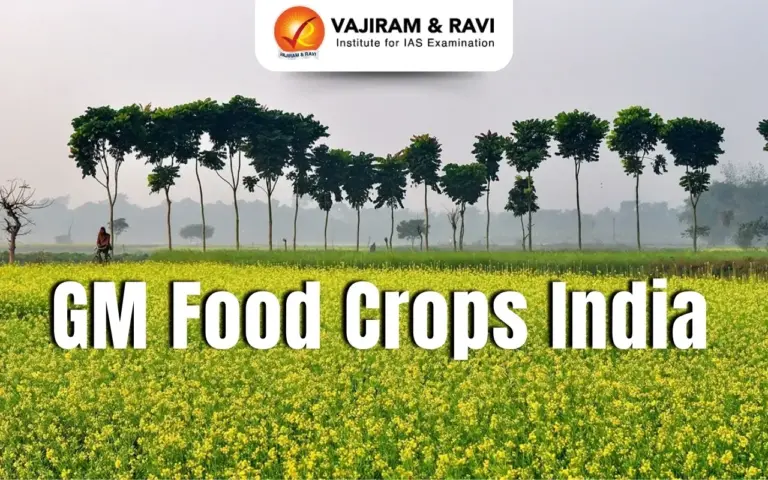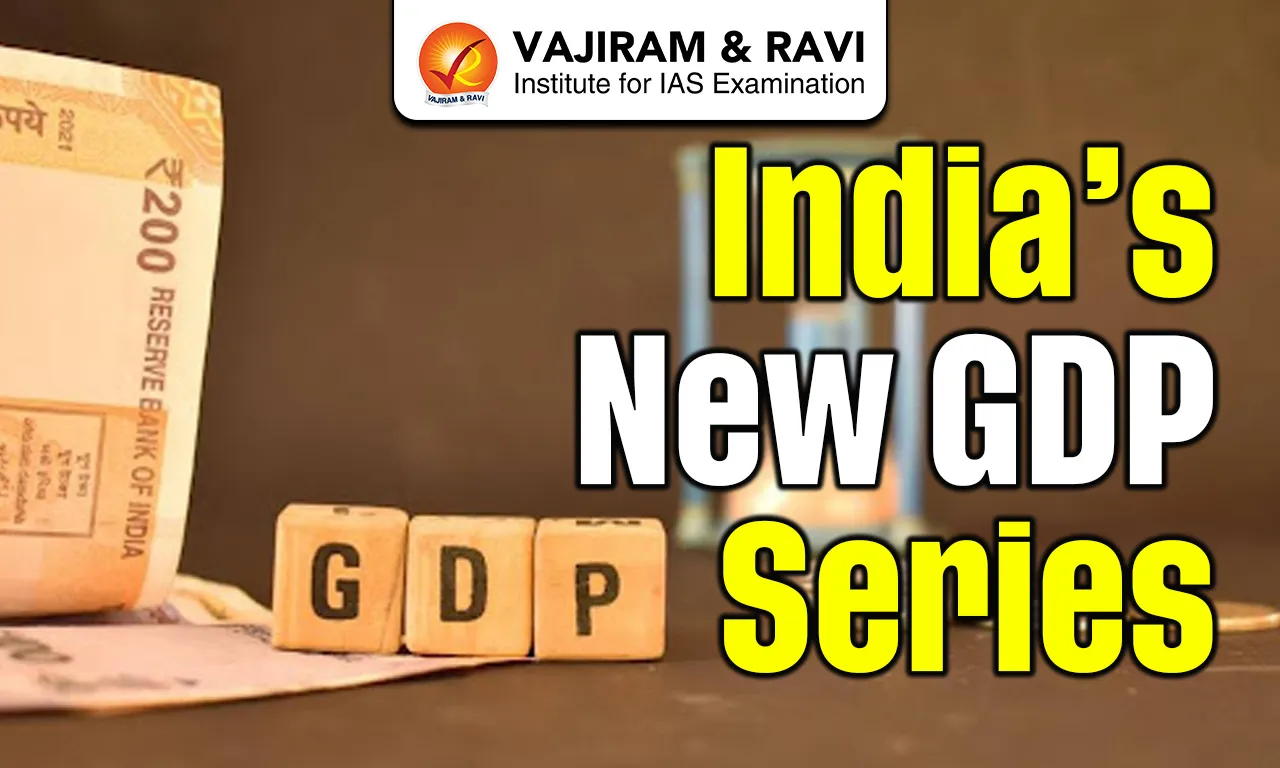What’s in Today’s Article?
- GM Food Crops Latest News
- Background: The GM Mustard Controversy
- Significance of GM Mustard
- Government’s Stand on GM Crops
- Supreme Court Proceedings and Split Verdict
- Concerns Raised by Activist Groups
- India’s Growing Bio-Economy and Role of GM Crops
- Way Ahead
- GM Food Crops in India FAQs
GM Food Crops Latest News
- Ahead of a fresh series of hearings in the Supreme Court next month over genetically modified (GM) food crops, the Department of Biotechnology (DBT) said there was “progress” on this front.
Background: The GM Mustard Controversy
- India’s efforts to promote genetically modified (GM) food crops are once again under national spotlight.
- The Supreme Court is scheduled to begin hearings on April 15, 2025, over petitions challenging the Environment Ministry’s 2022 approval for the commercial cultivation of GM mustard.
- The debate reflects a clash between scientific innovation and environmental activism, with the government pushing for biotechnology advancement while activist groups question the safety and ecological impact of GM food crops.
Significance of GM Mustard
- GM mustard is India’s first genetically modified food crop to receive conditional approval for commercial release by the Genetic Engineering Appraisal Committee (GEAC)—a scientific panel under the Ministry of Environment.
- Developed using public funds, the crop was intended to boost yields and reduce import dependency.
- However, due to legal challenges and safety concerns, it has not been cultivated commercially.
Government’s Stand on GM Crops
- Speaking at a biotechnology event, Department of Biotechnology (DBT) Secretary Rajesh Gokhale acknowledged that while the matter is subjudice, “progress” is being made on GM food crops.
- The DBT, under the Ministry of Science and Technology, has long funded research into transgenic crops.
- Science and Technology Minister Jitendra Singh emphasized the importance of embracing innovation, stating,
- “There is so much dynamism in biotechnology development that we cannot look at tomorrow through the prism of today.”
- The DBT has also submitted technical inputs to the Environment Ministry, which is tasked with formulating a national policy on GM crops, as directed by the Supreme Court in an earlier verdict.
Supreme Court Proceedings and Split Verdict
- In July 2024, a two-judge bench of the Supreme Court delivered a split verdict on the Environment Ministry’s 2022 approval of GM mustard.
- The matter was then referred to a larger bench, which will now begin hearings from April 15, 2025.
- The Court has asked all involved parties to submit their written statements before the proceedings begin.
- The case is seen as a landmark moment for India’s future biotechnology and agricultural policies.
Concerns Raised by Activist Groups
- Several environmental and farmer groups have strongly opposed GM mustard, citing:
- Potential ecological harm, including threats to pollinators like bees.
- Lack of long-term safety data for human consumption.
- Insufficient transparency in the approval process.
- These groups argue that GM food crops could disrupt traditional farming systems and compromise India’s biodiversity and seed sovereignty.
India’s Growing Bio-Economy and Role of GM Crops
- Despite regulatory hurdles, GM crops play a key role in India’s emerging bio-economy, as highlighted in a report released by the DBT.
- Key Highlights from the Bio-Economy Report (2024):
- India’s total bio-economy value: $165.7 billion
- Bio-agriculture share: $13.5 billion (8.1%)
- GM crops like Bt Cotton have significantly contributed to increased agricultural productivity.
- Bio-industrial sector (biofuels, bioplastics, enzymes): 47% of the total bio-economy
- Biopharma: 35%
- Bio-IT and research services: 9%
- India had 10,075 biotech startups in 2024, expected to grow to 22,500 by 2030, creating 35 million jobs.
- Maharashtra, Karnataka, and Telangana lead in bio-economy contributions.
Way Ahead
- The future of GM food crops in India depends on:
- Judicial clarity on environmental and health concerns.
- Policy formulation to balance innovation with biosafety.
- Public awareness and stakeholder engagement to address misinformation and mistrust.
- With the BioE3 policy focusing on creating new agricultural products using biotechnology, GM crops like mustard could be part of India’s long-term strategy for food security, climate resilience, and global competitiveness—but only if supported by sound legal and ethical frameworks.
GM Food Crops in India FAQs
Q1. What is GM mustard and why is it significant?
Ans. GM mustard is India’s first genetically modified food crop approved for commercial cultivation, aimed at increasing yield and reducing imports.
Q2. Why is GM mustard facing legal challenges?
Ans. Activist groups have challenged its approval citing safety, environmental, and procedural concerns, prompting Supreme Court intervention.
Q3. What is the government’s stance on GM crops?
Ans. The government supports biotechnology for agricultural advancement and is developing a national policy on GM food crops.
Q4. How do GM crops fit into India’s bio-economy?
Ans. GM crops enhance productivity and resilience, contributing to India’s $165.7 billion bio-economy, especially in bio-agriculture.
Q5. When will the Supreme Court hear the GM mustard case?
Ans. The hearings are scheduled to begin on April 15, 2025, before a three-judge bench of the Supreme Court.
Source: TH
Last updated on February, 2026
→ UPSC Notification 2026 is now out on the official website at upsconline.nic.in.
→ UPSC IFoS Notification 2026 is now out on the official website at upsconline.nic.in.
→ UPSC Calendar 2026 has been released.
→ UPSC Final Result 2025 is expected to be released in the first week of March 2026.
→ Check out the latest UPSC Syllabus 2026 here.
→ Join Vajiram & Ravi’s Interview Guidance Programme for expert help to crack your final UPSC stage.
→ UPSC Mains Result 2025 is now out.
→ UPSC Prelims 2026 will be conducted on 24th May, 2026 & UPSC Mains 2026 will be conducted on 21st August 2026.
→ The UPSC Selection Process is of 3 stages-Prelims, Mains and Interview.
→ Prepare effectively with Vajiram & Ravi’s UPSC Prelims Test Series 2026 featuring full-length mock tests, detailed solutions, and performance analysis.
→ Enroll in Vajiram & Ravi’s UPSC Mains Test Series 2026 for structured answer writing practice, expert evaluation, and exam-oriented feedback.
→ Join Vajiram & Ravi’s Best UPSC Mentorship Program for personalized guidance, strategy planning, and one-to-one support from experienced mentors.
→ Check UPSC Marksheet 2024 Here.
→ UPSC Toppers List 2024 is released now. Shakti Dubey is UPSC AIR 1 2024 Topper.
→ Also check Best UPSC Coaching in India


















